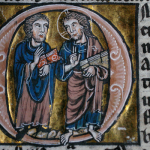JUSTICE, MERCY, AND THE FALL: Have been thinking a lot recently about justice and mercy, especially about the famous Adam Smith tagline, “Mercy to the guilty is cruelty to the innocent.” Here is a very much unformed thought about that, for you to handle as you wish.
In a lot of ways, contemporary political debate caricatures the left as the party of mercy and the right as the party of justice. Leftists want to free prisoners, end war, give poor people money and things, treat everyone equally, and protect kids’ self-esteem; right-wingers want to kill bad guys (domestic and foreign), give people only the money and things that they earn, treat people according to their deeds, and punish or hold back kids who haven’t done what they should. So goes the stereotype, anyway.
Smith’s quote points out some of the ways that naive or misapplied mercy can become itself merciless, thoughtlessly cruel–an obvious example would be freeing a murderer who then kills more people. Many of the debates about how widespread welfare affects culture and creates perverse incentives revolve around more subtle examples of Smith’s principle. Policing may seem like a “justice” act, but live in an unpoliced neighborhood for a while and you’ll see that it can also be a great mercy to a populace terrorized by criminals.
But justice isn’t just merciful to the innocent. It can also be a means of keeping the guilty from doing further harm–and thus a blessing in disguise to them. Chastisement can provoke repentance. Chastisement can force self-examination. It doesn’t always do that, of course, but anyone who’s seen how children behave when they receive no discipline, no training in accepting justice, should be able to see the point of justice. Mercy, when construed against justice, takes all kinds of distorted forms, from relativism (who are you to tell me what I’m doing is wrong? who are you to judge?) to utilitarianism (compassion trumps everything, and compassion is construed as the avoidance of suffering–cf. the statue of “Comfort” outside the euthanasia site in A Canticle for Leibowitz).
So that is the argument “from the right.” But then there’s Hamlet’s quick, harsh rejoinder: “Use each man after his desert, and who shall ‘scape whipping?” As I see it, that quote captures the central problem with both the “justice is greater than mercy” viewpoint (the “give ’em what they deserve–no less but definitely no more” stance) and the “mercy trumps justice” viewpoint (the “but it hurts!” stance). Both stances avoid grappling with the consequences of the Fall.
The mercy-uber-alles stance is based, I think, on an unwarranted faith in human goodness, such that if you treat people nicely they will be nice in return; it’s good to give people what they want, because what they want is good; and suffering is always bad, thus if something makes you suffer it can’t possibly be true, noble, or necessary.
But the justice-trumps-mercy stance is also flawed, because it divides the world into the Good Guys and the Bad Guys, and if you ever fall off the cliff into BadGuyLand, that’s it for you–you’ll get what you deserve. If you have a kid out of wedlock, don’t expect my help–you should have kept your pants zipped. If you rob a store, don’t expect me to visit you in prison, bring books to the prison library, or give you a second chance–I ought to ostracize you, both to maintain the disincentives to robbery and because you earned it. What have the sheep to do with the goats?
There are a lot of problems with this view, but perhaps the most obvious one is just that there is no one who does not need mercy. In life as in film noir, no one is innocent. Hamlet is right. “Oh, sure, fine,” you may say, “everybody makes mistakes. But the stuff I’ve done wrong is just, you know, little stuff, not like the really awful stuff that puts people beyond the pale, the stuff that makes them forfeit any mercy.” Well, yes, everyone likes to think that her own particular train of petty or not-so-petty deceits, cruelties, betrayals, and failures are mere trivia. This is why we lie to our diaries. But an honest review of our own lives should provide ample evidence for the prosecution (and I’ve noticed that the people who lead the best lives–the ones who really soar above decency into honor–virtually never consider themselves better-than, or even good-enough, or one of the “sheep”). I don’t think this claim can be argued for, really–it has to be lived through–so I won’t say more about it, except to say that we should learn mercy and humility from the times when we, or our loved ones, have needed them from others. (As for the claim that some people are Just Evil, it might be helpful to inquire why we are so certain that we would have done the right thing given the situation and some rough degree of personality similarities–would we have become Wei Jingsheng, or Deng Xiaoping? What about everyone we love? If we would want them to receive mercy–even if we knew they must also receive justice–how can we deny mercy to another?)
One of the things I found most attractive in Christianity (admittedly this is a long list) was its constant references to metaphors of marriage, union, communion. And one of the most powerful examples of that is the Christian belief (spelled out in St. Anselm’s terrific treatise Cur Deus Homo) that the Incarnation and Crucifixion were God’s way of marrying justice and mercy, being both fully just and fully merciful. In the words of the Psalmist, “Mercy and truth are met together; righteousness and peace have kissed each other” (Psalm 85:10).
Like I said, scattered thoughts, possibly in need of revision. I hope to post tomorrow on forgiveness and humor.











